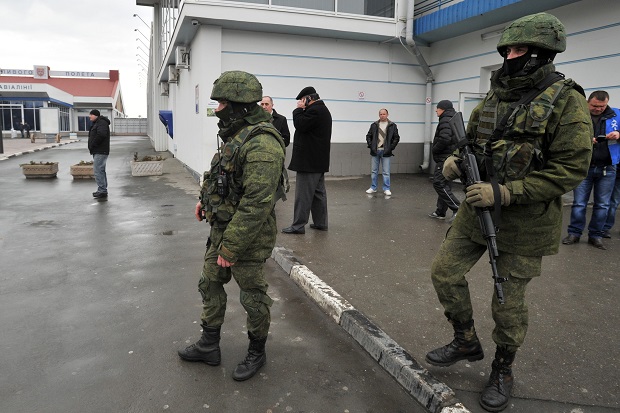What to make of the appearance at two airports in Crimea of armed men wearing uniforms without insignia? The airports are strategically placed – Belbek near Sevastopol, and the main airport outside Simferopol, the regional capital. Obviously, an airport is a vital piece of local infrastructure that provides an entry point for reinforcement and supply; their possible seizure by unidentified troops is a very serious business.
Authorities in Crimea insist that the armed personnel belong to the Russian Black Sea fleet, and that this is a ‘military invasion and occupation’. Meanwhile, a spokesman for the Russian Black Sea fleet has issued this communiqué:
‘No subdivision of the Black Sea Fleet has been advanced into the Belbek area, let alone involved in blocking it. Given the unstable situation around the Black Sea Fleet bases in the Crimea, and the places where our service members live with their families, security has been stepped up by the Black Sea Fleet’s anti-terror units.’
Irrespective of whether or not a ‘subdivision’ of the fleet has been deployed, the statement contains an obvious rationale to justify escalation: protection and self-defence. The fact that some of the armed men holding the airports call themselves ‘The People’s Militia of the Crimea’ is further cause for the Crimean authorities to be wary because Moscow has vowed to defend those it defines as its compatriots. Might the Black Sea fleet extend its protection to the ‘People’s Militia of the Crimea’?
The choreography around this strange episode looks suspiciously like ‘provokatsiya’ – and not necessarily by Russia because, theoretically, the new Ukrainian authorities benefit from international mistrust of Russia. Anne Applebaum has written about ‘provokatsiya’ in this week’s edition of the magazine. Here’s how she defines it:
‘Any educated guess about what the Russians might do next in Ukraine first requires an explanation of the concept of provokatisya. One of those non-Slavic words that nevertheless appears in every Slavic language (prowokacja in Polish, provokace in Czech), provokatsiya translates as ‘provocation’. But it has a narrower meaning as well: a political event or action which the authorities, through their secret services, create to serve their own purposes. A staged crisis; the publication of outrageous documents, authentic or fake; a rapidly organised political movement of the far-right or far-left; an anonymous bomb explosion; all of these are provokatsiya.’
Anne goes on to describe how these tactics, tried and tested by the KGB, may come to dampen hopes for real change in Ukraine. I recommend reading her piece in full.






Comments